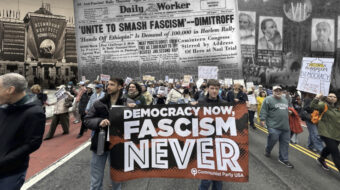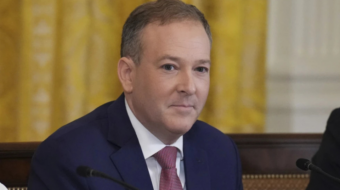
On this date in 2007, Bill McKibben begins to organize against climate change with a walk across Vermont, his home state. Begun as “Step It Up,” 350.org has evolved from climate scientists’ finding that atmospheric concentration of carbon dioxide – CO2 – above 350 parts per million is unsafe for life on Earth.
“If humanity wishes to preserve a planet similar to that on which civilization developed and to which life on Earth is adapted, paleoclimate evidence and ongoing climate change suggest that CO2 will need to be reduced from [current levels] to at most 350 ppm.”
That’s Dr. James Hansen talking, former head of the Goddard Institute for Space Studies, and one of the world’s most respected climatologists. When he says that climate change is incompatible with human civilization, people ought to sit up and take notice.
That “350 ppm” is where 350.org gets its name: “ppm” is simply a way of measuring the ratio of CO2 molecules to all of the other molecules in the atmosphere. Many scientists, climate experts, and progressive national governments agree that 350 ppm is the “safe” level of carbon dioxide.
Since the beginning of human civilization, our atmosphere contained about 275 ppm of CO2. Beginning in the 18th century, humans began to burn coal, gas, and oil to produce energy and goods. The amount of carbon in the atmosphere began to rise, at first slowly and now more quickly. Many of the activities we do every day, like turning the lights on, cooking food, or heating our homes, rely on energy sources that emit CO2 and other heat-trapping gases. We’re taking millions of years worth of carbon, once stored beneath the earth as fossil fuels, and releasing it into the atmosphere.
Right now we’re at 400 ppm, and we’re adding 2 ppm of carbon dioxide to the atmosphere every year. Unless we are able to rapidly turn that around and return to below 350 ppm this century, we risk triggering tipping points and irreversible impacts that could send climate change spinning truly beyond our control.
So far, we’ve experienced about one degree (Celsius) of warming, and the impacts are frightening. Glaciers everywhere are melting and disappearing fast, threatening the primary source of clean water for millions of people. Mosquitoes, which like a warmer world, are spreading into lots of new places, and bringing malaria and dengue fever with them. Drought is becoming much more common, making food harder to grow in many places. Sea levels have begun to rise, and scientists warn that they could go up as much as several meters this century. If that happens, many of the world’s cities, island nations, and farmland will be underwater. Meanwhile, the oceans are growing more acidic because of the CO2 they are absorbing, which makes it harder for animals like corals and clams to build their shells and exoskeletons. All around the globe, we’re stacking the deck for extreme weather – like hurricanes, typhoons, blizzards, and droughts – which exacerbates conflicts and security issues in regions that are already strapped for resources.
The Arctic and Antarctic are sending us clear messages that climate change is occurring much more rapidly than previously thought. In the summer of 2012, roughly half of the Arctic’s sea ice went missing (some scientists estimate the volume of summer sea ice loss as high as 80 percent). The entire Arctic region is undergoing drastic changes, threatening vital habitat for countless species (yes, including polar bears) and the livelihoods of many indigenous communities. This is also bringing us closer to dangerous tipping points, like the breakdown of the Greenland ice sheet and major methane releases from quickening permafrost melt.
This is the science of climate change. It is no longer up for debate: Our climate is changing profoundly and rapidly, and human activity is the cause. The political implications are obvious: The Earth cannot support the effects of climate deniers in public office.
Adapted from 350.org










